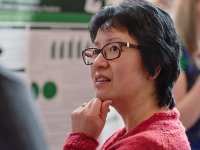Teacher as Researcher: The Ultimate Professional Development
Seeking to learn from what happens in the classroom, teacher researchers are innovators, curriculum drivers, agents of school change, and directors of their own professional development.
Teacher researchers pause each morning as they walk into their classrooms and ask, "What will my students teach me today?" To answer that question, they listen to and watch their students engage in authentic work; collect work samples, photographs, and transcripts to document what their students say and do; and use that information to evolve their practice as they celebrate and support the voices and experiences of the children they teach. In this sense, teacher researchers are innovators, curriculum drivers, agents of school change, and directors of their own professional development.
Support and Growth
As a doctoral student, I participated on the Writing and Reading Across the Curriculum Teacher Researcher Team led by Jane Hansen, Professor Emeritus at the University of Virginia and Reading Hall of Fame Member. For years, in preparation for our teacher research team meetings, I selected a piece of student writing that spoke to me. It would be a piece that made me scratch my head and ask, "What can I learn as a writer and teacher of writing from this young author?" or "What do I need to do next to support her growth?" I would capture these contemplations in a one-pager. That one-pager was exactly that, one page, and its content was reflective of my immediate classroom experience. During our small group meetings, every teacher researcher brought her one-pager, shared her contemplations, and elicited response from her team. We met weekly for one and a half hours. We took our work and time together seriously, because we had an internal charge to grow.
Diversity is essential in creating strong and dynamic teacher research teams. Each year our six- to eight-member group spanned across ages, gender, years of experience, grades, and content areas. Difference expanded the vocabulary of the room. As we heard our fellow researchers use new words and frameworks to discuss their experiences, we began to internalize those new ways of thinking, and thus pushed our own understandings of who and how we teach. Coming to know students as individuals and opening spaces for them to grow in their own directions is difficult work. Teachers' voices and contemplations need support. That is what teacher research teams do; they provide a place to lean and space to explore and expand.
The Best Tools
I have three primary tools that I use as a teacher researcher:
- My first tool is my spiral notebook. Here I jot notes while I conference with students, tape in samples of their work, and record insights and observations. Each evening, I reflect on my notes and use them to plan for tomorrow.
- My second tool is my iPhone. Throughout the day, I take pictures and videos of my students' writing samples, projects, and engineering feats. I often interview them as they share their innovative thinking. These visuals sometimes go in my spiral notebook, sometimes in my Evernote app, and often on my blog to parents. I also use them when I share my students' thinking and creations at our research team meetings and when I present at conferences or write about my practice. The visuals serve as an outward product of our classroom's evolution.
- My third and most important tool is my teacher research team. These colleagues focus me and serve as a sounding board and support network for my contemplations in the classroom.
Tapping Into the Power
The initial power of being a teacher researcher illuminates as you live the classroom life beside your students and realize that they have much to teach you. As you start to listen and record their thinking, you are amazed at the work that is happening in your room. Because of your amazement, you begin to more purposely structure your classroom to meet your students' needs. And because of that new structure, your students' learning is intensified, and their talk and work starts to surpass your own expectations. That power of being a teacher researcher is then clarified and intensified as you sit and discuss your observations and insights with your own teacher research team and receive their response.
Today, I am a classroom teacher and the research coach for our Saints Action Research team, part of our school's Center for the Study of Boys. In that role, I lead a team of seven teacher researchers who teach across grade levels and content areas, researching the work that gets done in their classroom, on the field, and in the studio.
This year I challenge you to join (or perhaps start) a teacher research team. Invite the experiences in your classroom, the questions in your head, and the support of your team to become your most powerful professional development. After all, the most effective curriculum is the one that follows the students, and the most successful professional development is the one that grows from the questions in your classroom.
